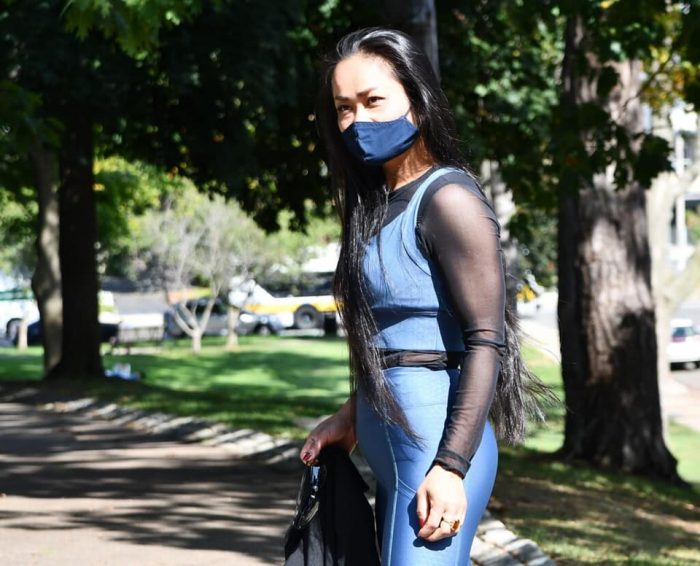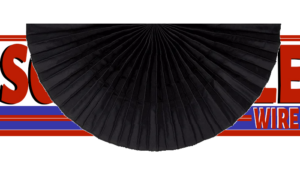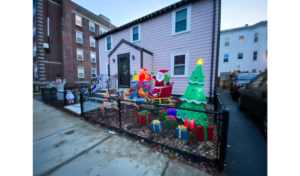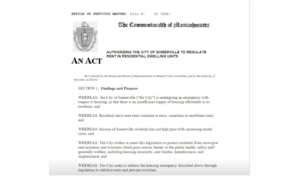A newly formed group aims to identify what it means to be Asian in Somerville.
(Somerville Wire) – Tina Lu, the organizer behind the Somerville Asian and Asian American Family Network, has lived in Somerville for almost ten years now, and while she has a few friends of Asian descent, she said that it has been fairly rare for her to walk down the street and to see people who look like her. This kind of perception had not always been on her mind, but recently, with the rise in anti-Asian hate crimes, she began to notice subtle forms of racism, such as a sign on a private residence that featured discriminatory language against Chinese people. Seeing this posting made her feel “nervous,” she said.
“Walking around every day, on my own street, I feel relatively safe,” said Lu. “However, there was something that really caught my attention earlier this year, that made me realize, these things happen here in Somerville. Do we know about it? Are we having systems to address when anti-Asian discrimination happens, whether it’s verbally, physically, or even just passively, on a sign somewhere? That really propelled me into action. Part of what I’ve been working on this past spring, for the past four months, is pulling together a network of families who have children of Asian descent. I really wanted to focus there because I’m a mom … I started meeting with folks across the different levels of City leadership and school leadership. Long story short, we have now formed a network on Facebook. It’s pretty small, very grassroots.”
The group now has about 70 members. The initial idea, said Lu, is to address problems at a systemic level. She said that she would like people in positions of influence and leadership to hear about concerns from the community. While this was the original concept, Lu said that she realized the group needed to look within first and understand who its members are, “inviting people into spaces to share their own stories, before we can even get to that level of making change or advocating for what we need.” Right now, they are in the process of setting up Community Building Meetings to take place over the summer, the first of which will be held on June 16. Later on, the group aims to hold listening sessions that local leaders can attend.
According to Chien-Chi Huang, the founder of Asian Women for Health, an organization that is based in Somerville but has been operating virtually during the pandemic, said that the anti-Asian violence that has shaken the country has contributed to mental health issues in the Asian American community.
“We know that during this time, people have felt really isolated. Before the pandemic, Asian women have tended to have higher rates of anxiety, depression, and suicidal ideation. We’re experiencing a double pandemic, because Trump weaponized the virus,” said Huang. “I personally have encountered a verbal attack on the subway in Boston.” She added, “Because of racism, a lot of Asian women are afraid to go out in public spaces. I know that in the beginning, people were trying to see if they should put on their masks, because they’re afraid to attract attention, and people will think that they are the carrier. That’s really stressful.”
Olo Bayul, a teacher in the Somerville Public School system and a member of the Advocacy Board for the Tibetan Association of Boston, said that while he has not heard about attacks on Asian Americans in Somerville, he does feel anxious about the elderly, especially when he thinks about his aging parents. Because of the pandemic, they do not step outside frequently, but when they do, Bayul always urges them to be careful.
“The way [Trump] coined the coronavirus and the way he was pushing his agenda created a very chaotic environment for Asian Americans, particularly elderly ones, who are often seen as people who can’t defend themselves,” said Bayul. “They become victims in this entire narrative. I’m not surprised to see that it’s mostly elderly Asian Americans who are getting hurt.”
Lu said that she would like Asian American stories to be heard by community leaders and to also see changes such as the inclusion of Asian history in school curriculums.
“What happened in March in Atlanta was definitely very traumatic for me and for many people that I know who identify as Asian, for a number of reasons: one, that it happened,” said Lu. “And then two, there are ways in which the stigmas that are generally placed on Asian women were the first that media reported on, and [they] were not necessarily seeing the women for who they were. In the time since then, I’ve been doing a lot of my own learning about Asian American history. As I’ve been reading, I’m realizing more and more, there’s just so much that I never got to learn growing up, in schools. That’s been a common refrain that I hear from my friends, who are of Asian descent. …Then there’s a third layer of trauma where because of March and what happened, Asians are now in the spotlight of having to talk about their experiences. But the reality is that for many folks, it’s hard to know what to talk about. Some of us haven’t even processed what it means to be Asian, here in America, for ourselves.”
All Somerville Wire articles may be republished by community news outlets free of charge with permission and by larger commercial news outlets for a fee. Republication requests and all other inquiries should be directed to somervillewire@binjonline.org.
SUBSCRIBE TO THE FREE SOMERVILLE WIRE EMAIL NEWSLETTER: https://eepurl.com/hpBYPv
Shira Laucharoen is assistant director of the Boston Institute for Nonprofit Journalism and assistant editor and staff reporter of the Somerville Wire.





